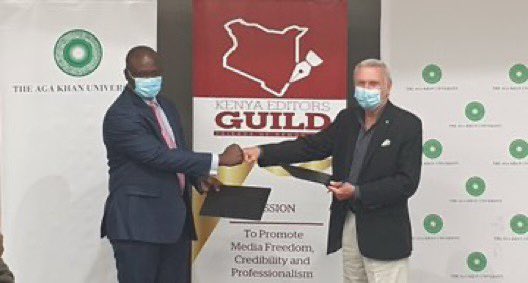
by Rosalia Omungo
The Kenya Editors’ Guild (KEG) and the Aga Khan University have entered a partnership to lay the groundwork for wide-ranging co-operation between the media industry and academia. The Memorandum of Understanding will, among other things, enable research cooperation between the two institutions and establish a professional development programme for editors’ continuous learning. The signing ceremony for the MOU took place on Monday 21 June at the Aga Khan University Centre, Nairobi.
Professor Larry Pintak, Dean of the Graduate School of Media and Communications (GSMC), signed for the media school while the Editors’ Guild was represented by its President Churchill Otieno.
“KEG sees journalism as a profession and no profession thrives without standards,” said Otieno. “Our core standard is the code of conduct. We must use the CPD (Continuous Professional Development) to allow members to improve their skill.”
His sentiments were echoed by Pintak, who commended the step taken by the Guild and pledged its support. “The idea of creating standards for journalists, to ensure they are working for the basic level — that’s an important thing,” he noted during the signing ceremony. “We’ll bring on board donors to help in the funding.”
Members of the Guild approved the policy on Continuous Professional Development during the Annual General Meeting on 24 April 2021. This followed a series of online sessions and presentations from professional associations that the Guild held in 2020.
“Our role drives the need to keep learning,” explained Otieno. “We must keep acquiring new knowledge, because only then shall we make an impact and be relevant to our audience.”
Continuous Professional Development is the ability to continually develop and improve skillsets and knowledge necessary for the effective and efficient performance of job-related tasks and for the adaptation of changes and strategies in the workplace. Continuous learning is an ongoing process that continues throughout one’s career and ensures ongoing competence in the profession.
CPD — sometimes and even interchangeably referred to as continuing professional education (in this case continuing journalism education) — has long been recognized and appreciated around the world as being critical to human capital development that contributes to individual knowledge, behaviour and performance, and organizational work processes and success.
Engaging in CPD means growth in knowledge and skills, enabling thoughtful, reflective practice, attending conferences, attending courses, networking, and creating opportunities to serve, such as training.
Mr. Stephen Gitagama, the Chief Executive Officer of Nation Media Group and chairman of the Media Owners Association, lauded the partnership and urged participants to ensure the framework is developed to global standards.
“There is a lot of money in the industry which we can harness if we create the necessary standards,” he noted.
According to Dr. Nancy Booker, academic director of the GSMC, “Creating intimate linkages with the media and industry ensures that journalism, education and training addresses the needs of the profession.”
And provost Dr. Alex Awiti lauded this milestone, advising media leaders to embrace innovation. “There is a tremendous contribution we can make to bolster and enhance capacity of media leaders,” he concluded, “especially when innovation becomes the second name of journalists.”
Rosalia Omungo is Chief Executive Officer of the Kenya Editors’ Guild and a member of the Kenya Environment and Science Journalists Association.